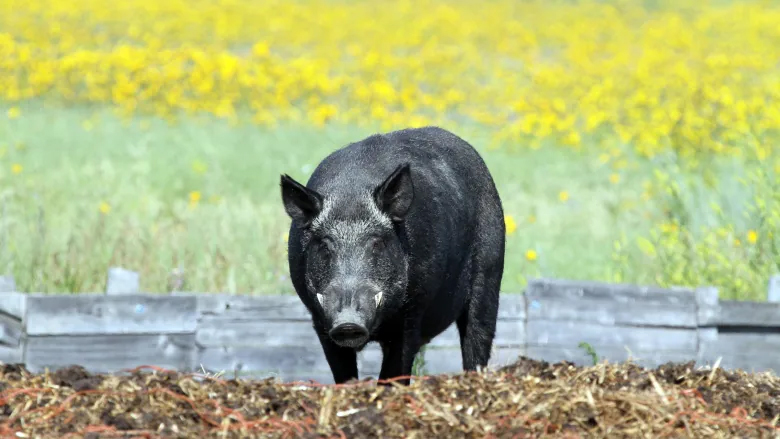B.C. could be dealing with a rise in feral hogs in the aftermath of this year’s wildfires

An invasive species expert is concerned B.C.’s record-breaking wildfire season may have contributed to a problem with invasive wild boars in the province
CBC News
Gail Wallin, executive director of the Invasive Species Council of B.C., said she’s aware of reports of pigs escaping pens that were damaged by fires, but that it’s unclear how many pigs remain in the wild. She said many were caught and returned to their owners.
But it’s an urgent matter as, according to Wallin, they can quickly become established as a feral pig population.
Domestic pigs can quickly revert to their traditional, boar-like characteristics in just a few short generations, with their coats or hair changing colour. Their tusks can grow, and they will also become more aggressive than domestic pigs, said Wallin.
“The only path to success in controlling Wild Pigs is to respond quickly and respond really aggressively, and unfortunately we just haven’t seen that anywhere in Canada yet”B.C. has had invasive feral pigs spread in some areas, including the Chilcotin, Peace and Thompson-Okanagan regions, but the province hasn’t had the severe problem with wild boars experienced in some of the prairie provinces.
According to Wallin, it’s not clear how many of the wild pigs are currently roaming the province.
Environmental damage and health risks
The invasive species can cause severe environmental damage and pose significant health risks, according to Ryan Brook, a professor and wildlife researcher at the University of Saskatchewan.
Brook said time is one of the most important factors when it comes to controlling the spread of the invasive animals.
“The only path to success — and there is only one — is to respond quickly and respond really aggressively, and unfortunately we just haven’t seen that anywhere in Canada yet,” he said, adding that invasive wild pigs are the worst invasive large mammals on the planet.
“They cause huge, widespread crop damage — they destroy natural ecosystems,” said Brook. “There’s nothing I can think of that would be worse.”
He said they defecate and urinate in water, infecting it with salmonella and E. coli, and carry diseases that can spread to other animals, as well as humans.
Hunting not an effective solution
The possibility that pigs have escaped their pens, as fences have burned in wildfires, is worrying for Wallin.
Once a few pigs become wild, she said with large litters, it doesn’t take long for them to reproduce and rapidly multiply.
A burned property in Kelowna, B.C., is pictured in August, 2023. Wildfires tearing through rural property damaged infrastructure, including fences, potentially allowing livestock like pigs to escape. (Tom Popyk/CBC)
Despite incentives in Alberta for hunters to target wild pigs, and hunting being legal in B.C., both Brook and Wallin said research has shown hunting is not an effective way to deal with wild pigs.
“Do not hunt them,” said Wallin. “The real concern about hunting a group of pigs is that you’re going to break them up.”
She explained that if you take a few pigs away from a group, the others will disperse and then reproduce, creating new, potentially larger groups of pigs called sounders.
The Invasive Species Council of B.C. is asking residents to report any sightings and take time to spot anything that might be unusual in their area.
Signs of wild pigs include rooting, which is when they turn the soil while digging for food, or tracks, which are comparable to white-tailed deer but are slightly rounded and point outwards.
Sightings can be reported to the B.C. government using its RAPP line and on the Invasive Species Council of B.C. website or app.
Wallin said aside from reporting any sightings, people raising pigs should ensure fencing around pens are undamaged to prevent their escape.












